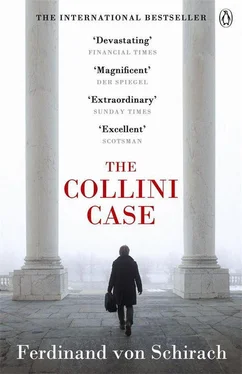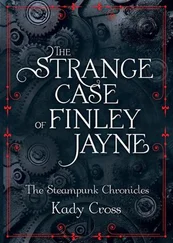No one in the firm, Baumann continued, had any idea why Meyer had been murdered. The old man had still been chairman, but he was sure it was nothing to do with the firm. Mattinger was surprised. The crime was only a few hours old, and Baumann could already say he was sure of that.
The board, he went on, wanted Mattinger to represent the firm in the murder trial. Mattinger explained that that wasn’t possible: only a family member could ask him to act as accessory prosecutor. Most civil lawyers, he added, weren’t aware of it, but that was the law. Baumann promised to see about that, and another hour later there was a fax on Mattinger’s desk from the murder victim’s granddaughter and sole heir, Johanna Meyer, sent from London.
Mattinger promised Johanna Meyer that he would take care of everything. Tomorrow he would speak to the public prosecution office in Berlin and then report back to all concerned. His young colleague went into his office and did the paperwork.
At around eleven o’clock Mattinger was home again. His girlfriend was already asleep, in the guestroom as usual. He got himself a glass of iced water from the kitchen and went into the garden. There was a smell of freshly mown grass. He took off his tie and unbuttoned his shirt. It was still too hot. He pressed the cold glass to his forehead. The extraordinary meeting of the board in Munich had been fixed for three o’clock the following afternoon. Mattinger wouldn’t have any answers by then. He didn’t even know the right questions.
Leinen spent the first night after Collini’s arrest writing a petition. He sat at the kitchen table in his apartment with legal textbooks and commentaries open in front of him. There was a small black-and-white TV set on the table as well. Most of the time he kept it turned on with the sound muted. However, when the news headlines came on at ten-thirty there was a short film about the dead man, pictures with a few brief comments: Hans Meyer with Konrad Adenauer, Hans Meyer with Ludwig Erhard, Hans Meyer with Helmut Kohl. The presenter said the motive for the murder was not clear, and the public prosecutor’s office was still investigating. More pictures showed the Hotel Adlon, the remand prison, the police station where the murder squad was based. The alleged murderer, said the presenter, was an Italian citizen.
At around five in the morning Leinen printed out the petition he had drafted; at seven he had the final version. The text had turned out well, but he wasn’t sure that it would do him much good. He was petitioning to step down from Collini’s defence, asking the examining magistrate to rescind his duty to provide legal aid in this case.
At seven-thirty he left his apartment. It had been raining, and the air was cool and fresh now. He went to a news kiosk and bought all the daily papers. The murder of Meyer was on nearly every front page.
On the ground floor of Leinen’s building, two storeys below his apartment, there was a bakery, or rather a ‘bake shop’, an Identikit branch of a large chain. The baker was a very fat man, red-faced, with small hands: his knuckles looked like dimples on the backs of them. He could move surprisingly fast, but he was too stout for the narrow space behind the display shelves, and the counter cut into his big belly, leaving a line of breadcrumbs on his apron. The baker had put three old wooden chairs outside his shop, and in summer Leinen would sit there on the pavement every morning, drinking coffee and eating one of the poor-quality croissants. Sometimes the baker joined him. Today he said Leinen was looking terrible.
Leinen took the suburban train to the courthouse building. A busker with a guitar went along the carriages bawling out a Bob Dylan song; no one but a few tourists gave him any money. Just after eight Leinen was at the Moabit Criminal Court building.
The Capital Crimes Department of the public prosecutor’s office was on the third floor, with steel-framed armoured glass in the windows looking out on the corridor. He had done three months’ work experience in this department, and knew most of the public prosecutors here, at least by sight. The court registry office was stacked high with files up to the ceiling, in pigeonholes, on shelves, desks and the floor, arranged according to some unfathomable principle. All the paperwork to do with cases of violent death ended up here. There were files on all kinds of killings: murder, manslaughter, suicide bombings, hostage-taking ending in death. Postcards sent by secretaries when they were away on holiday were pinned up on the walls: sunsets, beaches, palm trees. Computer monitors bristled with photos of children and husbands.
Leinen gave the reference number of the file and showed the clerk in the registry the document naming him as court-appointed defence counsel. She gave him a thin folder. She too knew Leinen from his work experience here, and wished him luck with the case. It would be difficult for the defence, she said, looking at him sympathetically. Richard Mattinger had already said he would be appearing as counsel in the accessory prosecution. Leinen also learned that the autopsy on the body was to be at one o’clock in the Forensic Institute.
He took the file and wondered whether he ought to visit his client, but he couldn’t think of anything that he could usefully discuss with Collini. He leafed through the pages while he walked down the corridors to the lawyers’ room.
The defending lawyers’ common room in the Moabit Criminal Court was a safe haven; no client, no judge, not even the interpreters were allowed in. It had existed since the days of the Weimar Republic, and famous defence lawyers such as Max Alsberg had frequented it in the 1920s. It hadn’t changed much to this day. The lawyers read the newspapers there, phoned the registry offices, wrote their pleas or waited for a trial to resume. You could hire a robe for a euro; the secretary took a note of phone calls, and sometimes offered sweets to lawyers she liked. But above all this was where defence counsel chatted. They exchanged gossip about judges and public prosecutors, discussed trials, shared advice on petitions, made and dissolved alliances. If a judge did not stick to an agreement, or a public prosecutor withheld information, this was where defence counsel heard about it. They talked frankly, admitted to failures and boasted of success. In here they spoke of their clients in different terms, and cracked jokes about the crimes to help them cope with the stress. The coffee came from a vending machine and tasted of plastic and powdered milk. The furnishings were rather shabby, the upholstery of the sofas threadbare.
Leinen headed for the copiers at the back of the room, and was still reading the file as he crossed the lawyers’ room. He collided with another lawyer, papers fell to the floor. Leinen apologized, picked the papers up and went on. When he was standing by the copier he saw Richard Mattinger on a sofa reading the newspapers. Leinen went over to him.
‘Good morning, Herr Mattinger,’ he said. ‘I’m Caspar Leinen. We’re appearing in the same trial.’
‘Fabrizio Collini? The Hans Meyer case?’
‘Yes, that’s right.’
Mattinger stood up and shook hands. ‘May I offer you a cup of coffee?’ he said.
‘Thanks, yes. It’s good to meet you,’ said Leinen. ‘I went to a lecture you gave on criminal proceedings.’
‘I trust I didn’t talk too much nonsense,’ said Mattinger, going over to the coffee maker with Leinen. He put a coin in the slot. The two lawyers waited for the machine to disgorge a brown plastic beaker. ‘I hope no one’s had tomato soup yet this morning, or the next fifty cups of coffee will taste appalling.’
‘Thank you. It’s pretty bad to start with.’ They went back to the sofa and sat down.
Читать дальше












